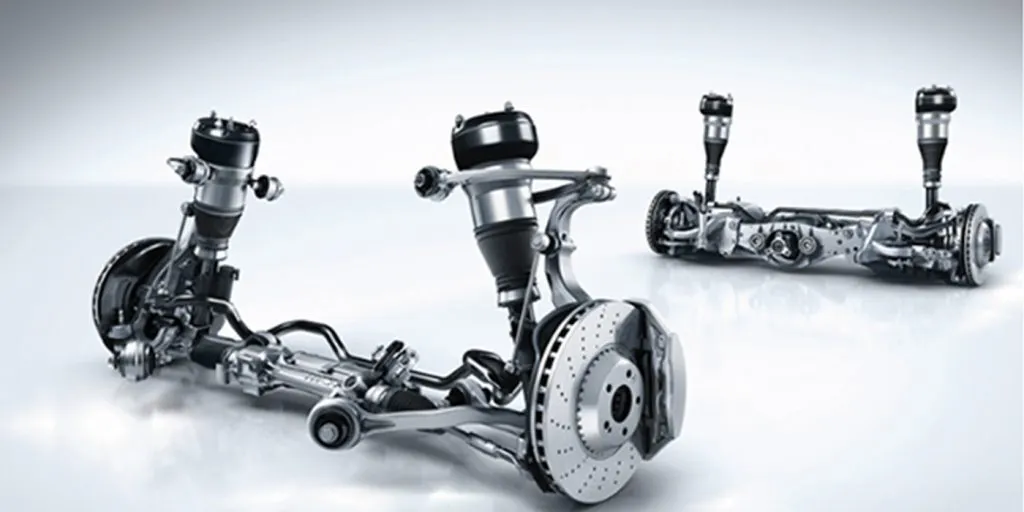The Rise of Intelligent Suspension in Modern Automobiles

Introduction
The Advanced Suspension Control System Market is transforming vehicle dynamics by enhancing ride comfort, stability, and handling through intelligent and adaptive suspension technologies. These systems actively respond to driving conditions, road surfaces, and vehicle load to deliver a smoother and safer driving experience. Advanced suspension control systems are widely used in luxury vehicles, sports cars, commercial vehicles, and increasingly in electric and autonomous vehicles to improve performance and passenger comfort. With rising consumer expectations for superior ride quality, vehicle safety, and driving precision, automakers are integrating electronically controlled and semi-active/active suspension systems into next-generation vehicle platforms. The market is projected to grow at a CAGR of around 8–9% over the forecast period, driven by technological advancements in sensors, AI, IoT, and electronic control units. As the automotive industry moves toward smart mobility and autonomous driving, intelligent suspension systems are becoming a key differentiator for premium vehicle performance.
Market Drivers
Growing demand for improved driving comfort and vehicle handling is a key driver boosting adoption of advanced suspension control systems. Rising sales of luxury and high-performance vehicles globally are supporting market growth, as these vehicles typically incorporate advanced suspension technologies to enhance ride dynamics. Increasing focus on safety and vehicle stability, particularly at high speeds and in adverse road conditions, is encouraging OEMs to upgrade from traditional suspension systems to intelligent electronically controlled ones. The shift toward electric vehicles (EVs) is another major driver, as EVs require optimized suspension systems to balance battery weight and improve overall efficiency. Advancements in sensors, predictive control algorithms, and real-time road monitoring systems are enabling more accurate and responsive suspension adjustments. Additionally, growing consumer preference for premium comfort features and automakers’ efforts to differentiate their offerings are further fueling market adoption.
Market Challenges
High development and integration costs remain a major challenge for widespread adoption of advanced suspension systems, particularly in mid-range and budget vehicle segments. The complexity of electronic and software-based control systems increases manufacturing and maintenance costs for OEMs and end users. Limited awareness and acceptance of advanced suspension benefits in cost-sensitive markets slow adoption rates. Ensuring long-term durability and reliability of electronic suspension components under varied climatic and road conditions is another concern. Integration with existing vehicle platforms requires significant engineering modifications, increasing design and production time. Cybersecurity risks associated with connected vehicle technologies also pose concerns regarding the safety of electronically controlled suspension. Additionally, high repair and replacement costs may discourage customers in emerging markets from opting for vehicles with advanced suspension features.
Market Opportunities
Growing adoption of autonomous and connected vehicles presents substantial opportunities for advanced suspension control systems. Autonomous vehicles require highly stable and comfortable ride dynamics, making intelligent suspension technologies a core component of future mobility solutions. Development of lightweight and energy-efficient suspension systems for EVs offers new innovation avenues for manufacturers. Integration of AI, machine learning, and real-time vehicle-to-infrastructure (V2I) communication into suspension systems enables predictive adjustments, improving safety and passenger comfort. Emerging markets such as India, Southeast Asia, and Latin America offer growth opportunities as demand for premium vehicles and comfort-enhancing features increases. Collaboration between technology firms, automotive OEMs, and component suppliers to develop cost-effective suspension systems for mass-market vehicles will expand market reach. The commercial vehicle sector, including trucks and buses, also presents opportunities, as fleet operators seek improved fuel efficiency, reduced maintenance, and better ride comfort for long-haul transportation.
Regional Insights
Europe dominates the Advanced Suspension Control System Market due to strong presence of premium automotive brands such as BMW, Mercedes-Benz, Audi, Porsche, and Volvo, which actively integrate advanced suspension technologies. North America shows strong growth driven by demand for luxury and high-performance vehicles, advanced road infrastructure, and increasing consumer preference for comfort and safety features. The Asia-Pacific region is expected to witness the fastest growth due to rising vehicle production, expanding premium vehicle sales, and increasing adoption of smart automotive technologies in China, Japan, and South Korea. China’s rapid EV growth further supports suspension advancements tailored to electric mobility. Latin America and Middle East & Africa are gradually adopting advanced suspension systems, particularly in luxury and imported vehicles, with long-term growth potential aligned with economic development and increased consumer purchasing power.
Future Outlook
The future of the Advanced Suspension Control System Market will be shaped by autonomous mobility, smart electronics, and next-generation vehicle architectures. Predictive and adaptive suspension systems using AI and cloud-connectivity will become mainstream, allowing vehicles to anticipate road conditions and adjust suspension in advance. Active suspension will replace conventional mechanical systems, delivering superior comfort, enhanced safety, and improved driving dynamics. Integration of suspension intelligence with ADAS, braking, steering, and traction control systems will create a fully coordinated vehicle control ecosystem. Lightweight materials, reduced energy consumption, and modular suspension designs will support EV efficiency goals. As autonomous vehicles evolve into mobile living spaces, ultra-smooth ride experiences enabled by intelligent suspension will become a core expectation. With continued innovation and cost optimization, advanced suspension systems are expected to expand beyond luxury segments into mid-range vehicles over time.
Conclusion
The Advanced Suspension Control System Market is evolving rapidly as the automotive industry prioritizes intelligent mobility, safety, and enhanced ride quality. Demand for smoother handling, predictive vehicle control, and premium comfort features is driving widespread adoption of electronically controlled and active suspension solutions. Although high costs, integration complexities, and limited awareness pose challenges, ongoing technological innovation and the rise of EVs and autonomous vehicles are unlocking new growth opportunities. As future vehicles become smarter, connected, and more autonomous, advanced suspension control systems will play a key role in delivering superior passenger experience, performance, and road safety. The market is set for strong long-term growth as intelligent suspension becomes a standard requirement for next-generation vehicles globally.
- Art
- Causes
- Crafts
- Dance
- Drinks
- Film
- Fitness
- Food
- الألعاب
- Gardening
- Health
- الرئيسية
- Literature
- Music
- Networking
- أخرى
- Party
- Religion
- Shopping
- Sports
- Theater
- Wellness
